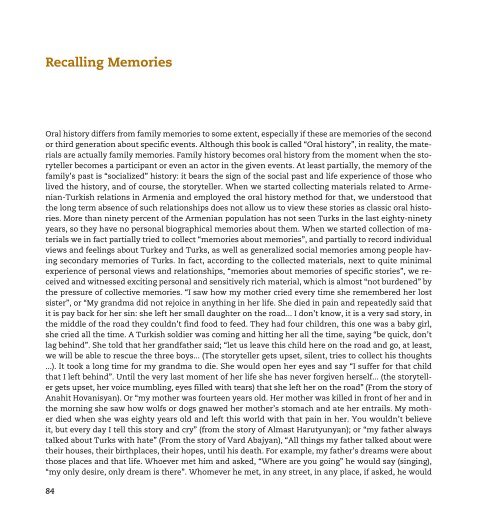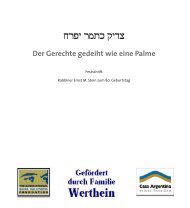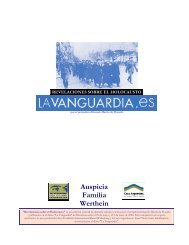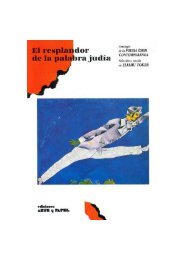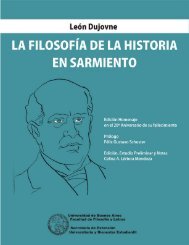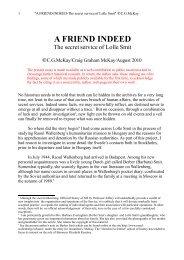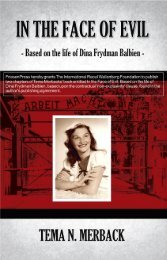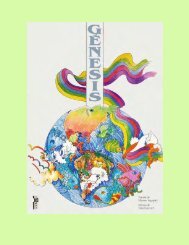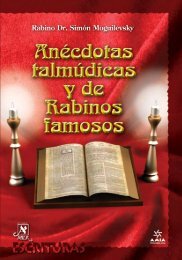Recalling MemoriesOral his<strong>to</strong>ry differs from family memories <strong>to</strong> some extent, especially if these are memories of the secondor third generation about specific events. Although this book is called “Oral his<strong>to</strong>ry”, in reality, the materialsare actually family memories. Family his<strong>to</strong>ry becomes oral his<strong>to</strong>ry from the moment when the s<strong>to</strong>rytellerbecomes a participant or even an ac<strong>to</strong>r in the given events. At least partially, the memory of thefamily’s past is “socialized” his<strong>to</strong>ry: it bears the sign of the social past and life experience of those wholived the his<strong>to</strong>ry, and of course, the s<strong>to</strong>ryteller. When we started collecting materials related <strong>to</strong> Armenian-Turkishrelations in Armenia and employed the oral his<strong>to</strong>ry method for that, we unders<strong>to</strong>od thatthe long term absence of such relationships does not allow us <strong>to</strong> view these s<strong>to</strong>ries as classic oral his<strong>to</strong>ries.More than ninety percent of the Armenian population has not seen Turks in the last eighty-ninetyyears, so they have no personal biographical memories about them. When we started collection of materialswe in fact partially tried <strong>to</strong> collect “memories about memories”, and partially <strong>to</strong> record individualviews and feelings about Turkey and Turks, as well as generalized social memories among people havingsecondary memories of Turks. In fact, according <strong>to</strong> the collected materials, next <strong>to</strong> quite minimalexperience of personal views and relationships, “memories about memories of specific s<strong>to</strong>ries”, we receivedand witnessed exciting personal and sensitively rich material, which is almost “not burdened” bythe pressure of collective memories. “I saw how my mother cried every time she remembered her lostsister”, or “My grandma did not rejoice in anything in her life. She died in pain and repeatedly said thatit is pay back for her sin: she left her small daughter on the road... I don’t know, it is a very sad s<strong>to</strong>ry, inthe middle of the road they couldn’t find food <strong>to</strong> feed. <strong>The</strong>y had four children, this one was a baby girl,she cried all the time. A Turkish soldier was coming and hitting her all the time, saying “be quick, don’tlag behind”. She <strong>to</strong>ld that her grandfather said; “let us leave this child here on the road and go, at least,we will be able <strong>to</strong> rescue the three boys... (<strong>The</strong> s<strong>to</strong>ryteller gets upset, silent, tries <strong>to</strong> collect his thoughts...). It <strong>to</strong>ok a long time for my grandma <strong>to</strong> die. She would open her eyes and say “I suffer for that childthat I left behind”. Until the very last moment of her life she has never forgiven herself... (the s<strong>to</strong>rytellergets upset, her voice mumbling, eyes filled with tears) that she left her on the road” (From the s<strong>to</strong>ry ofAnahit Hovanisyan). Or “my mother was fourteen years old. Her mother was killed in front of her and inthe morning she saw how wolfs or dogs gnawed her mother’s s<strong>to</strong>mach and ate her entrails. My motherdied when she was eighty years old and left this world with that pain in her. You wouldn’t believeit, but every day I tell this s<strong>to</strong>ry and cry” (from the s<strong>to</strong>ry of Almast Harutyunyan); or “my father alwaystalked about Turks with hate” (From the s<strong>to</strong>ry of Vard Abajyan), “All things my father talked about weretheir houses, their birthplaces, their hopes, until his death. For example, my father’s dreams were aboutthose places and that life. Whoever met him and asked, “Where are you going” he would say (singing),“my only desire, only dream is there”. Whomever he met, in any street, in any place, if asked, he would84
say (singing), “I would go <strong>to</strong> graves<strong>to</strong>nes of my father and mother, walk in our houses” (From the s<strong>to</strong>ryof Vazgen Ghukasyan); “In the spring time my mother would take me with her, sit on the green, sing,worry, mumble. When I remember it, my mother’s heart was hungry, that is why she sang, her country,her world was taken away... My mother was very sick, she would say “sister, get up and let’s go and sing,collect some khavrtsil” 1 , she would say brother, I would not be able <strong>to</strong>, but should go, go <strong>to</strong> our house,when I die I will get over there. This is how she died”. (From the s<strong>to</strong>ry of the Nranhat, Grish Badalyan’ssister). Those, who recounted these memories never, saw a Turk. <strong>The</strong>se are witnessed accounts containingfragments of s<strong>to</strong>rytellers’ biographies, not secondary memories, at the same time they are verypersonal and not the “product” of social or collective views. And they could not be as such, because asit was said “the <strong>to</strong>pic was taboo” in Soviet Armenia and, quite naturally, the population of the countrydid not accumulate social ideology and experience <strong>to</strong>ward Turkey and Turks, so people’s s<strong>to</strong>ries actuallyfor most part are individual. This is an important confirmation, because, despite this fact, these s<strong>to</strong>riesare in many respects similar, i.e. individual and family s<strong>to</strong>ries of the survivor Armenians from differentparts of Turkey have much in common, and as the collected accounts reveal, they have created acommon attitude. This is important since it affirms that the common attitude was formed without public/socialmemory fac<strong>to</strong>r, and is rather based on each one’s personal experience. 2To return <strong>to</strong> the issue of genocide publicity in Armenia we should mention that in the sixties the memoriespartly “went beyond families”, and in the eighties the young generation, again partially, s<strong>to</strong>ppedbeing the direct bearer of “family memories”. I will dare <strong>to</strong> say that they s<strong>to</strong>pped being the “prisoner”of them. After the 1965 rallies, the construction of the monument for the victims of the Genocide inYerevan, 3 the bringing public processions of April 24 <strong>to</strong> proper order, monuments were built and booksand articles were published by the initiatives of individuals and groups, despite active or passive resistancefrom authorities. This was facilitated, <strong>to</strong> a certain extent, by the publication of the “Anlreli Zangakatun”[Never-abating Bell-<strong>to</strong>wer] poem by Paruyr Sevak; the relatively public, kind of street- and saloon-discussions by Hovhannes Shiraz; and the publication of some of his poems. <strong>The</strong> works by ParuyrSevak and Hovhannes Shiraz were circulated from hand <strong>to</strong> hand, being recited at the meetings ofstudent groups and in the homes of people. During this very period those survivors who were alreadyreaching a mature age, along with their second generation, were making timorous attempts of publishing“from beneath” those memories that were <strong>to</strong>rturing them.1 Sort of wild herbs that used <strong>to</strong> put in their food.2 During the first years of Soviet rule those few materials that were accessible, <strong>to</strong> this or that extent, as a publication on thetheme, were partially available through poetry (Hovhannes Tumanyan, Yeghisheh Charents), and partially through scientificworks: in 1928-1929 Bagrat Boryan compiled a source-book: “Armenia, <strong>International</strong> Diplomacy, and USSR”. In relationwith terri<strong>to</strong>rial claims presented <strong>to</strong> Turkey by Stalin in 1946-1951, his<strong>to</strong>riography partially raised the problem of terri<strong>to</strong>riesthat were abandoned by Armenians; however, on the one hand, this phenomenon was not presented comprehensively andon the other, these discussions were completely out of the context of survivors, who neither directly participated in discussions,nor even had the capacity of mass or public expression of their views at that time. <strong>The</strong> problem remained in the domainof high politics and the public was mostly unaware of the sufferings of particular persons.3 <strong>The</strong> monument devoted <strong>to</strong> the Genocide victims was opened on November 28, 1967.85
- Page 2 and 3:
Published by:Institut für Internat
- Page 5 and 6:
ContentsForeword...................
- Page 7 and 8:
ForewordThe project “Adult Educat
- Page 10 and 11:
Aras, Yasin Aras, Welat Ay, Cenk Ce
- Page 12 and 13:
The main audience of this book is o
- Page 15 and 16:
“Wish they hadn’t left”:The B
- Page 17 and 18:
ed by 1915 and where memories of Ar
- Page 19 and 20:
1915 tends to be represented by int
- Page 21 and 22:
Yet to a large extent, Turkish inte
- Page 23 and 24:
this, we can’t. It’s impossible
- Page 25 and 26:
een very advanced in trade and craf
- Page 27 and 28:
How to Come to Terms with Phantom P
- Page 29 and 30:
It is always you who has to be nice
- Page 32 and 33:
to the way he was raised: “They f
- Page 34 and 35: empathize with Armenians: “My aun
- Page 36 and 37: Adil is not the only one marked by
- Page 38 and 39: ness may be an attempt to overcome
- Page 40 and 41: dernity and the oral transmission o
- Page 42 and 43: A soup pot with spoons around itAt
- Page 44 and 45: What if My Mother is Armenian?Ruhi
- Page 46 and 47: If I were younger I’d get baptize
- Page 48: with butter. We’ll serve the impo
- Page 51 and 52: The time Salih and Gavrik are worki
- Page 53 and 54: Turkey’s changing context is refr
- Page 55 and 56: ‘It was to be expected.’ And my
- Page 57 and 58: against one another. The feet of th
- Page 59 and 60: Fear of Losing a CityZübeyde was b
- Page 61 and 62: half for me.’ But what do our Mus
- Page 63 and 64: e discussed when the kids were arou
- Page 65 and 66: possible by the difference in relig
- Page 67 and 68: The Charm of AraratMehmet is a 62-y
- Page 69 and 70: dogs protected the sheep against wo
- Page 71 and 72: The Story of the “Night People”
- Page 73 and 74: “I don’t know why, but my grand
- Page 75: Research in Armenia:“Whom to Forg
- Page 78 and 79: and can generally be located in Tur
- Page 80 and 81: “Whom to Forgive? What to Forgive
- Page 82 and 83: “Private Stories”After the esta
- Page 86 and 87: In the village of Ujan, where the v
- Page 88 and 89: The home-museum of Gevork Chaush in
- Page 90 and 91: Memorial in the Ashnak village dedi
- Page 92 and 93: other regions are entirely populate
- Page 94 and 95: sources and materials for their mem
- Page 96 and 97: Ergir’s Soil is Strong, Ergir’s
- Page 98: Tatevik, the granddaughterof Mihran
- Page 101 and 102: eral meanings in Armenian -”whole
- Page 103 and 104: The Gospel with Golden Binding of S
- Page 105 and 106: keeps a copper chalice that was bro
- Page 107 and 108: In some families the passports of t
- Page 109 and 110: at that time, Mustafa and Jamal, wh
- Page 111 and 112: People were so frightened to lose g
- Page 113 and 114: naked, they were decapitating every
- Page 115 and 116: Water, Fire, Desert“There was an
- Page 117 and 118: his mother dragged him behind her,
- Page 119 and 120: Many of our narrators mention the R
- Page 121 and 122: In the word-stock of the survivors
- Page 123 and 124: in Kurdish villages, and helping th
- Page 125 and 126: “Well, They Are Human Too”Even
- Page 127 and 128: member this well, they said, the el
- Page 129 and 130: speak to each other. Questioned by
- Page 131 and 132: Hamze Ptshuk, survived from Hosnut
- Page 133 and 134: “I don’t Know...”Why did this
- Page 135 and 136:
“My Dear Almast, Write it Down, W
- Page 137 and 138:
took his rifle and ran. The dog fel
- Page 139 and 140:
she didn’t tell it to me. In the
- Page 141 and 142:
elder guy in this house died and hi
- Page 143 and 144:
AH - Turks always killed to get int
- Page 145 and 146:
“My Father used to Tell us at Hom
- Page 147 and 148:
person... I have never seen him, bu
- Page 149 and 150:
gotten what you knew”. So, out of
- Page 151 and 152:
a paid Adult Residential Facility,
- Page 153 and 154:
It was probably after 60s... My fat
- Page 155 and 156:
the Vardevar 1 day . Even if we mak
- Page 157 and 158:
that this wasn’t a dream... and..
- Page 159 and 160:
was our historical village. Nich, I
- Page 161 and 162:
just filming around myself with no
- Page 163 and 164:
that person whether I could take a
- Page 165:
[Turk. wife]”. In the morning I t
- Page 168 and 169:
4 Albert Mamikonyan,1953, in Kirova
- Page 170 and 171:
11 Almast Harutyunyan,1920, Ujan vi
- Page 172 and 173:
18 Eleonora Ghazaryan.1949, Ashnak
- Page 174 and 175:
26 Nairi Tajiryan,1936, Egypt (Cair
- Page 176:
33 Vazgen Ghukasyan,1933, Ashnak vi


